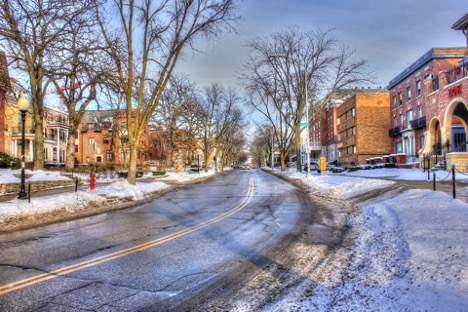
Wisconsin is the 20th-most populous state and the 25th-largest state in the U.S. It has Minnesota to the west, Iowa to the southwest, Illinois to the south, Lake Michigan to the east, Michigan to the northeast, and Lake Superior to the north.
The majority of people in Wisconsin reside in communities that are close to Lake Michigan. The largest city, Milwaukee, serves as the focal point of the state’s largest metropolitan area and is followed by the third-and fourth-most populous Wisconsin cities, Green Bay and Kenosha, in that order.
If you’re planning a move to Wisconsin, it’s crucial to know all the major things about it, as you may experience an entirely new life.
From the state’s cost of living to its food, this article will cover the basics of living in the heart of America’s Dairyland and give insight into the many things that make Wisconsin a fantastic place to live.
- Moving Services
We all know that moving out to a new place can be challenging and overwhelming, and settling in requires a lot of work and juggling numerous tasks. You might need help organizing your belongings.
In this case, hiring a moving company can be helpful. Professional movers have the skills to securely pack up your belongings and help you prevent any damage from happening during the moving procedure.
Moving companies are found in every city to assist residents in making a smooth transition. For instance, if you are relocating to Madison, the state’s capital, you can look up a moving company there.
Additionally, you may require a temporary storage facility to keep your belongings secure if your new home isn’t ready and you have to move.You can choose Discovery Storage, as they offer madison self storage options.
They offer premium storage spaces and extras like temperature-controlled storage and shipping services, giving you access to everything you need for your move or storage project.
- Cost of Living
One of the major contributors to the cost of living is housing.
Wisconsin has a 4% cheaper cost of living than the rest of the U.S. and has the 20th-lowest average cost of living among all the states.
In the state, the average rent for a one-bedroom apartment is $677 per month, and $1,087 for a home with four or more bedrooms. In addition, it has a median house value of $173,600, which is $31,300 less than the $204,900 national average, while groceries cost about 2% less than the rest of the nation, and so does apparel.
However, the cost of healthcare services, including dental cleanings and doctor checkups, is 12% higher than the national average.
In addition, non-essential costs like entertainment and grooming services are 2% less.
The cost of living in Wisconsin is relatively affordable, with cities like Madison and Milwaukee ranked as some of the most livable in the Midwest.
- Job Market
The unemployment rate in Wisconsin is 3.2%, which is lower than the national average of 3.7%., which indicates that the job market is blooming.
Several resources are available for job seekers in Wisconsin, including the state’s Job Center network and the Department of Workforce Development’s Job Center website.
According to research, by 2028, people can anticipate 111,926 new jobs in Wisconsin, and the number of jobs will rise from 3.2 to 3.3 million, with a 3.5% increase.
Wisconsin also offers many job training and apprenticeship programs to help residents find employment to give them a boost of hope.
- State Income Tax
Wisconsin has a state income tax of 7.65%, higher than the national average of 4.6%.
However, the state offers several deductions and tax credits to compensate for this cost. Wisconsin’s individual income tax rates range from 3.54 percent to 7.65 percent.
If you’re moving to Wisconsin from another state, you may be able to claim a Moving Expense Deduction on your federal income tax return.
By understanding how taxes work in Wisconsin, you can be better prepared for your move and budget accordingly.
- Property Tax
Wisconsin ranks 8th in the nation with an average effective rate of 1.53% for property taxes.
It means that, on a home worth $100,000, you can expect to pay $1,450 in property taxes each year. Overall, taxes in Wisconsin are higher than the national average, but some offsetting factors are to consider.
Sales tax in Wisconsin is 5%, but there are additional taxes on certain items like alcohol and gasoline.
The rate depends on your income and filing status but ranges from 4.6% to 7.65%.
Wisconsin has a maximum local sales tax rate of 1.75 percent, a state sales tax of 5.00 percent, and an average of 5.43 percent for both.
In short, property taxes are high in Wisconsin but are compensated by lower sales and income taxes.
- Weather
Wisconsin is known for its unpredictable weather. The state is in the midwest, so it experiences all four seasons. There are typically 200 sunny days per year, with pleasant but hot and humid summers. It receives 34 inches of rain and 48 inches of snow annually.
The winter months are ideal for skiing because they are long and cold and frequently dip below freezing.
The weather in the spring can be pleasant or chilly and rainy. However, fall is probably the best time of year weather-wise, with crisp, cool days and beautiful foliage. The changing leaves are a sight to behold.
To dress for each weather, you’ll need to have a good mix of clothes for all seasons. For example, a heavy coat and boots are a must for winter, while shorts and t-shirts will do for summer.
All in all, you’ll love Wisconsin every season.
- Transportation
When it comes to transportation, Wisconsin has a lot to offer.
From the state’s extensive network of highways and interstates to its many public transit options, including buses, trains, and even ferries, there’s a transportation option for everyone in Wisconsin.
You can also go cycling, a popular option with the state’s scenic bike trails.
Having a dependable mode of transportation is essential because many rural areas of the state lack access to public transportation.
CONCLUSION
Every city has unique characteristics and different cultures, and Wisconsin is no different.
Like with any move, there are some things you should be aware of before making the big switch.
Now that you know a little more about what to expect when moving to Wisconsin, we hope you feel better prepared for your big move.
We wish you all the best in your new home and hope you enjoy everything Wisconsin offer.
Paid Guest Post



